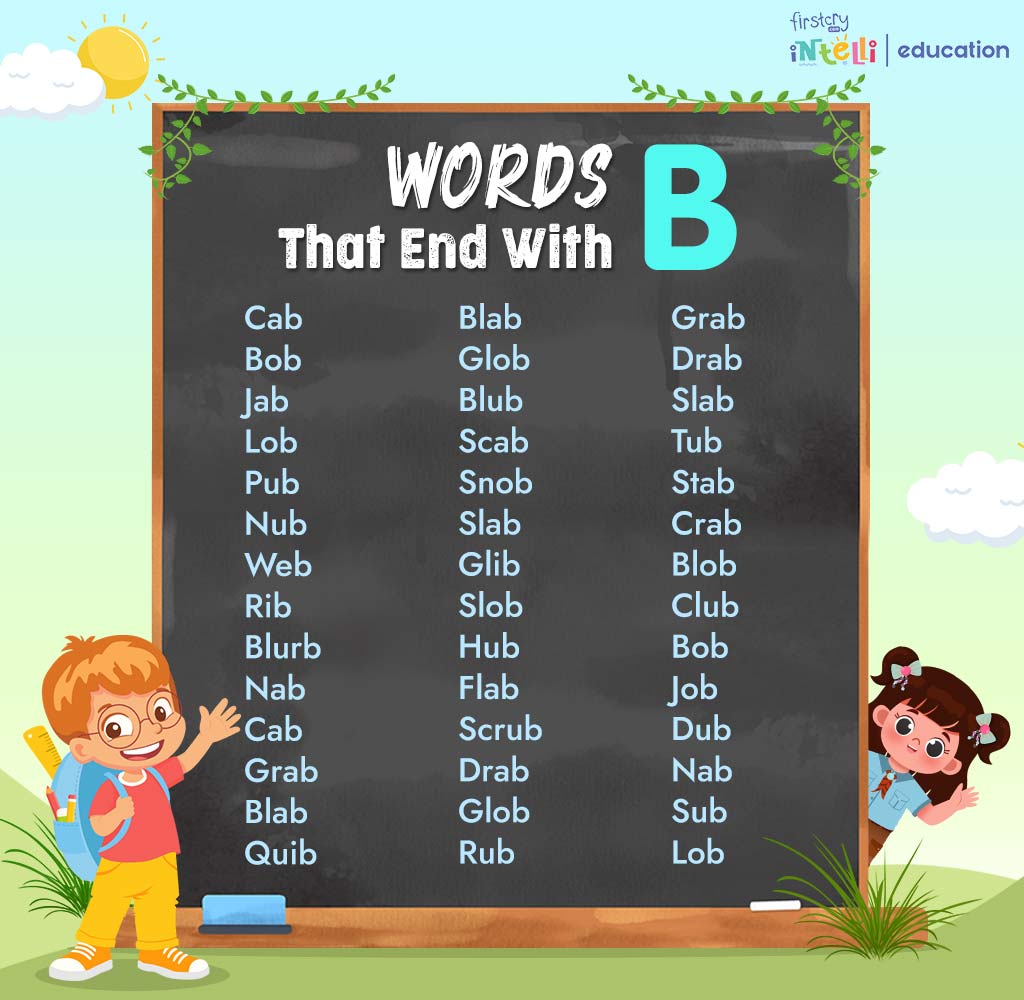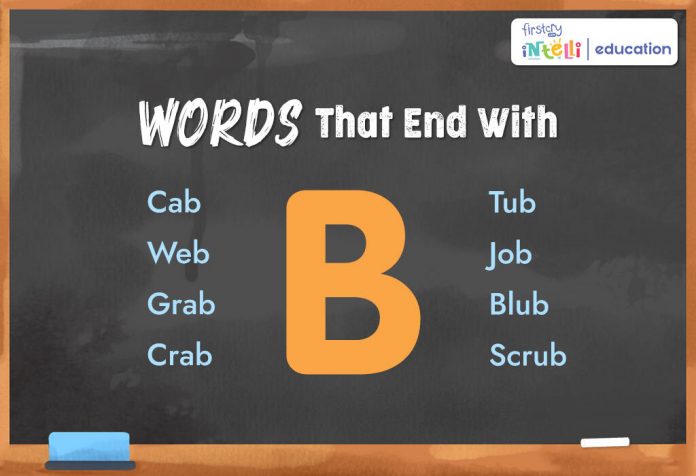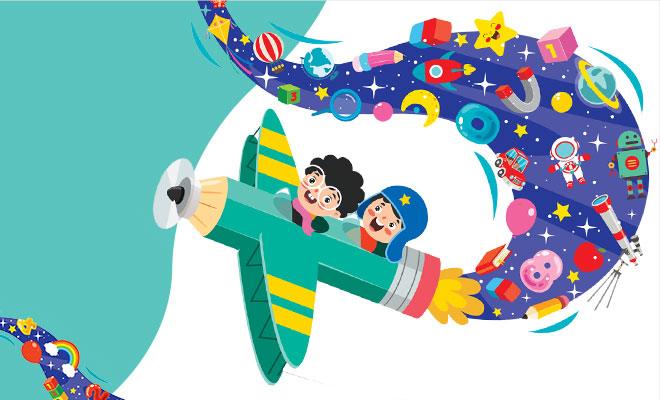Building a strong vocabulary is an essential part of children’s early learning. Learning words that end with the letter B helps children recognise spelling patterns and develop their reading and pronunciation skills. This article presents an engaging list of words ending with B for preschoolers and kids aged 5 to 8 (classes 1 to 3). These words can be used for spelling games, reading practice, and language exercises at home or school. Exploring words that end with ‘B’ for kids encourages confidence and makes learning English a fun experience.
List Of Common Words That End With B
Here is a list of common English words with B in the end that children will find helpful to practice. These simple words help with spelling and vocabulary building while being easy to read and understand.
Thank you for reading this post, don't forget to subscribe!
| Cab | Blab | Grab |
| Bob | Glob | Drab |
| Jab | Blub | Slab |
| Lob | Scab | Tub |
| Pub | Snob | Rub |
| Nub | Slab | Stab |
| Web | Glib | Crab |
| Rib | Slob | Blob |
| Blurb | Hub | Club |
| Nab | Flab | Bob |
| Cab | Jab | Job |
| Grab | Scrub | Cab |
| Blab | Drab | Snob |
| Lob | Glob | Dub |
| Quib | Nab | Pub |
| Sub | Rub | Tub |
3-Letter Words Ending In B
Short three-letter words ending in “B” are great for young learners beginning to spell and read. These words ending with the letter B are common in everyday language and help children recognise the letter B at the end of words.
| Bob | Cab | Jab |
| Lob | Pub | Rub |
| Sub | Tub | Web |
- Bob – A boy’s name or to move up and down quickly.
- Cab – A taxi or car for hire.
- Jab – A quick poke or punch.
- Lob – To throw something in a high arc.
- Pub – A place where drinks and food are served.
- Rub – To press and move something repeatedly.
- Sub – Short for submarine or a type of sandwich.
- Tub – A container for holding water or liquids.
- Web – A sticky home built by spiders.
4-Letter Words Ending In B
Four-letter words ending in B help children progress to longer words while practising spelling and vocabulary. This section includes short words that end with B for early learners.
| Drab | Slab | Scab |
| Blab | Glib | Blub |
| Slob | Glob | Knob |
- Drab – Dull or lacking colour.
- Slab – A large flat piece of stone or wood.
- Scab – A Hard covering on a healing wound.
- Blab – To tell secrets or talk too much.
- Glib – Talking smoothly but without thinking.
- Blub – To cry loudly.
- Slob – A messy or untidy person.
- Glob – A lump or blob of sticky substance.
- Knob – A round handle on doors or drawers.
5-Letter Words Ending In B
Five-letter words ending in B are less common but perfect for children expanding their vocabulary. These English words ending in B are useful for improving spelling and understanding longer word patterns.
| Rehab | Blurb |
| Adlib | Nabob |
- Rehab – Short for rehabilitation, the process of getting better.
- Adlib – To speak or perform without preparation.
- Blurb – A short description on the back of a book.
- Nabob – A wealthy person (less common but interesting word).
Nouns That End With B
This section introduces common nouns that end with B. These include animals, places, and objects that are familiar to children and can be easily used in everyday conversations.
| Web | Crab | Tub |
| Bob | Pub | Slab |
| Jab | Lob | Scab |
| Blob | Club | Snob |
- Web – The sticky home a spider spins with thread.
- Crab – A small sea animal with claws and a hard shell.
- Tub – A large container used to hold water or liquids.
- Bob – A person’s name or to move up and down quickly.
- Pub – A place where people buy drinks and food.
- Slab – A large flat piece of stone or wood.
- Jab – To poke something quickly.
- Lob – To throw something in a high curve.
- Scab – A hard crust that forms over a healing cut.
- Blob – A small lump or drop of a soft substance.
- Club – A group of people who meet for shared activities.
- Snob – Someone who thinks they are better than others.
Verbs Ending With B
Some verbs ending in “B” are used frequently in English and are great for children to learn for speaking and writing.
| Jab | Grab | Blab |
| Rub | Lob | Sub |
| Nab | Drub | Snub |
- Jab – To poke or punch quickly.
- Grab – To take hold of something suddenly.
- Blab – To tell secrets or talk too much.
- Rub – To press and move something back and forth.
- Lob – To throw something gently in a high arc.
- Sub – To substitute or go under something (like a submarine).
- Nab – To catch or seize quickly.
- Drub – To beat or hit hard (less common but useful).
- Snub – To ignore or treat someone coldly.
Adjectives Ending With B
Few adjectives end with the letter B, but here are examples of describing words that children can use:
| Drab | Glib |
- Drab – Lacking brightness or colour, dull.
- Glib – Speaking in a smooth but insincere way.
Adverbs Ending With B
Adverbs ending with B are rare in English, especially at a level suitable for young learners. Words such as “plumb” are sometimes used adverbially but are advanced and not normally taught at early stages.
Words That End With B Chart
A chart showing simple and common words that end with ‘B’ for kids would help children visualise and remember these words. Here’s one for reference:

FAQs
1. What Are Some Easy Words That End With The Letter B?
Simple words like bob, cab, jab, tub, pub, and web are excellent for children starting to learn spelling.
2. How Can Children Learn Spelling Words Ending With B?
By practising saying the words aloud, writing them down, and using them in fun games and sentences.
3. Are There Many Verbs Ending With B?
A few common verbs ending with B include jab, grab, rub, lob, and blab.
4. Why Is It Important To Learn Words Ending With B?
Learning word endings helps children recognise patterns in spelling and pronunciation, which improves their reading and writing skills.
Learning words that end with the letter B is a fun way to help children improve their spelling and vocabulary. Starting with simple words like “bob” and “pub” gives them confidence and encourages their love of reading. Practising these words regularly helps build strong language skills for the future.











